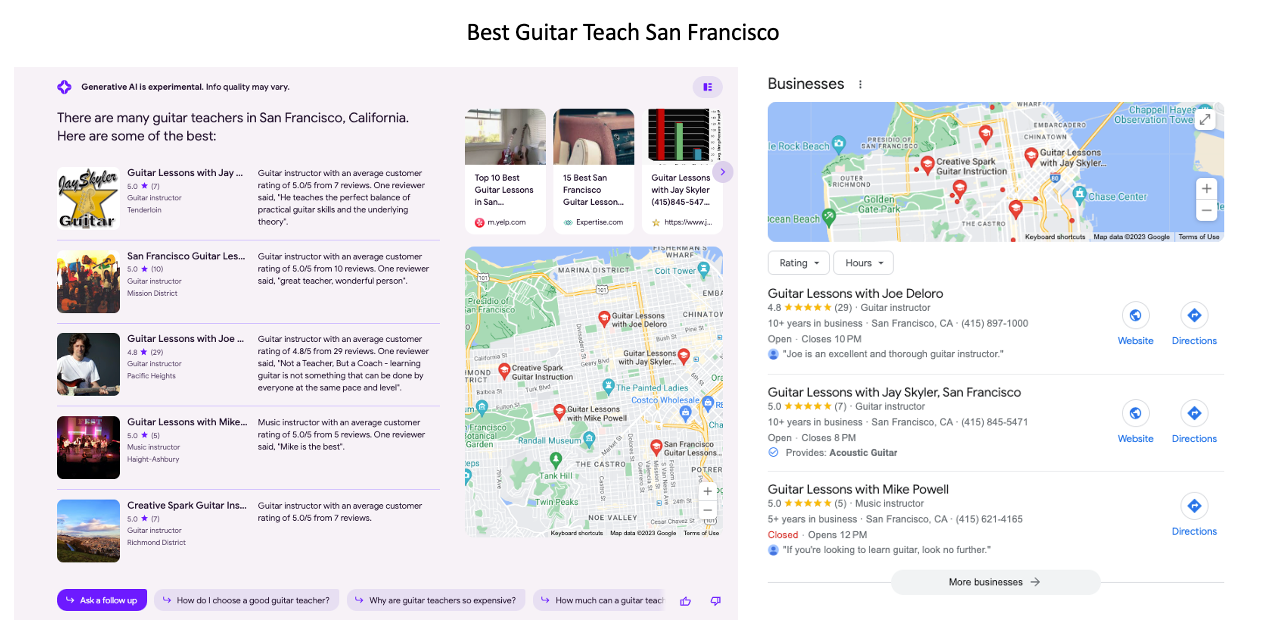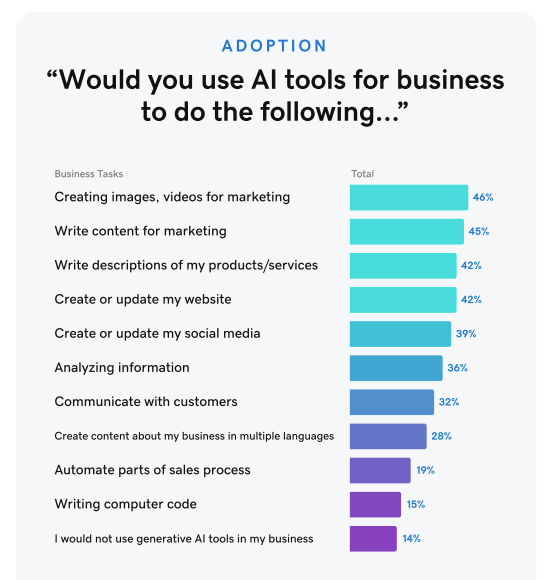Google AI Dump, SGE Pack, SMBs Satisfied with AI

Google AI Feature Dump
Google this week released a barrage of AI-driven updates to Search, Shopping and Maps. The company started by reiterating all the things you can do with an improving Google Lens, soon also available to Bard. What this means practically is that you can upload photos and Bard can create content around them. Another post, intended to promote using SGE for travel planning, emphasizes that local AI Snapshots are being created from reviews, photos and GBP details. Google Maps themselves are getting more Immersive View landmarks, "glanceable directions" and improvements to Recents (recent places visited) on the desktop. Google AI is also powering a new virtual try on filter in Shopping. Using its Shopping Graph, Google trained the AI to enable users to see how specific clothing items look on a wide range of images of real models. The idea is to find the model with your body type and see, by extension, what the desired item might look like on you.

Our take:
- All of this was previously announced. Now these features are rolling out or expanding. The PR frenzy is generally for investors' benefit.
- Most of these features will probably see limited usage. Virtual try on may be different. Snap and Amazon offer a less sophisticated version.
- Subtext for marketers: fully build out GBP with images, etc. and get those reviews; also Merchant Center for local product sellers.
Merge SGE with the Local Pack
The Local Pack and Google SGE local results co-exist in the new experimental AI SERP. But the treatment of SGE is changing or evolving. One example is YMYL. It was there and now it's mostly not. More generally, Google offers an "automatic" SGE result in some cases but in others users are asked to "generate" SGE results by clicking a button. Google appears to be moving in what might be described as a more conservative direction, showing automatic SGE results less often. I previously said I liked SGE but wasn't sure how useful it is. That's especially true in a local context. The Local Pack usually appears immediately below the SGE Snapshot and two or all three Pack results are usually present in the Snapshot. The SGE result has more stuff in it but is less useful than the existing Local Pack. What Google should do is combine the best elements of both into a new Local Pack.

Our take:
- SGE is a neither fish nor fowl feature because of Google's fundamental ambivalence about AI changing the UX and SERP.
- A combination of SGE and the Pack would be better. The current SGE result is mostly redundant. And five listings is better than three.
- Solving self-preferencing: make an "SGE Pack" opt-in (generate). Local organic results would then become more prominent.
SMBs Satisfied with AI Tools
Claiming to be the "first-ever survey of U.S. small businesses on generative AI" (it's not) GoDaddy published findings from an April 2023 poll of just over 1K US businesses with 50 or fewer employees. Roughly 38% of SMBs said they had tried AI tools, some "for fun" (27%) and some "for business" (11%). Overwhelmingly ChatGPT (70%) and Bard (29%) were the ones used. Interestingly, Bing did not appear at all, though Microsoft-owned Github did. The dominant use cases were, not surprisingly, marketing (64%) and content creation (61%). Interestingly, 75% (of the 38%) were highly satisfied with the AI's performance. In terms of anticipated future use cases (graphic below), creating images/videos for marketing, marketing content, product/service descriptions, website creation/updates and social media content topped the list of aided responses. Also not a surprise, GenZ and Millennials owners were more likely than Gen X or Boomers to have tried these tools.

Our take:
- As always, surveys are directional only. However, there are some interesting findings here.
- Respondents seem to clearly understand the business use cases for AI, except for perhaps customer service applications (29%).
- This was striking: the vast majority of AI users were satisfied with the results. Expectations are low today and that may be partly why.
Recent Analysis
- Missing Reviews: A Step-by-Step Recovery Guide, by Mike Blumenthal
- Google SGE: Meet the New Pack, by Greg Sterling
Short Takes
- New "business" tab in Google Maps simplifies GBP management.
- Google Location Assets will automate ad localization.
- How AI/ChatGPT can help and hurt local SEO.
- Woman on mission to prove Yelp, Google reviews untrustworthy.
- Google sues major fake listings/reviews scammer-spammer.
- A compendium of Google Business Profile bugs.
- Bing effect: Chrome loses market share to Edge.
- Google Domains shutting down, Squarespace buying accounts.
- Subreddit blackout affecting Google search results quality.
- European Commission seeks break up of Google's ad business.
- 45% of shoppers who use BOPIS wind up buying other stuff too.
- J Crew creates immersive e-commerce "beach house."
- Sol Reader is the Kindle of XR headsets (built for books).
- Vision Pro more like iPad than the iPhone in terms of potential.
Listen to our latest podcast.

How can we make this better? Email us with suggestions and recommendations.

